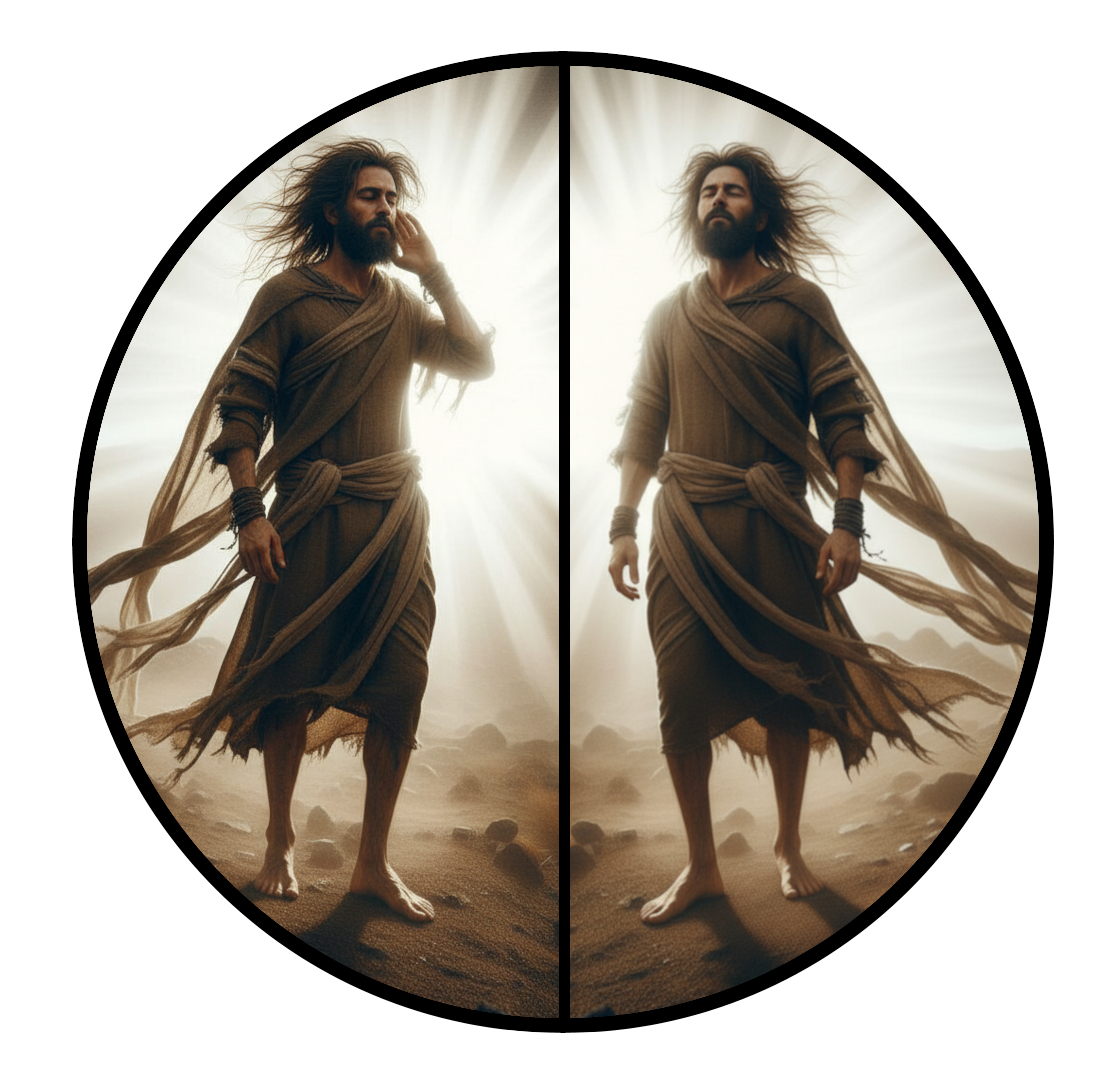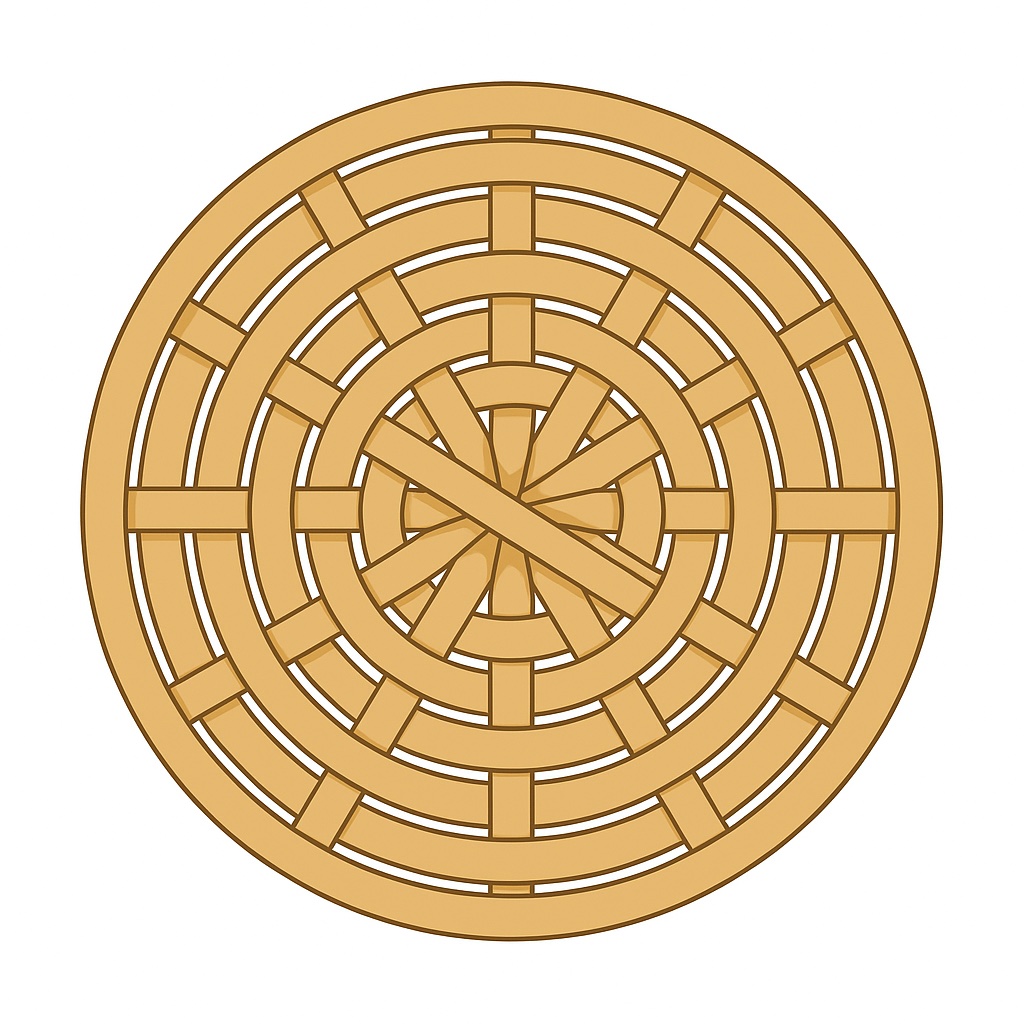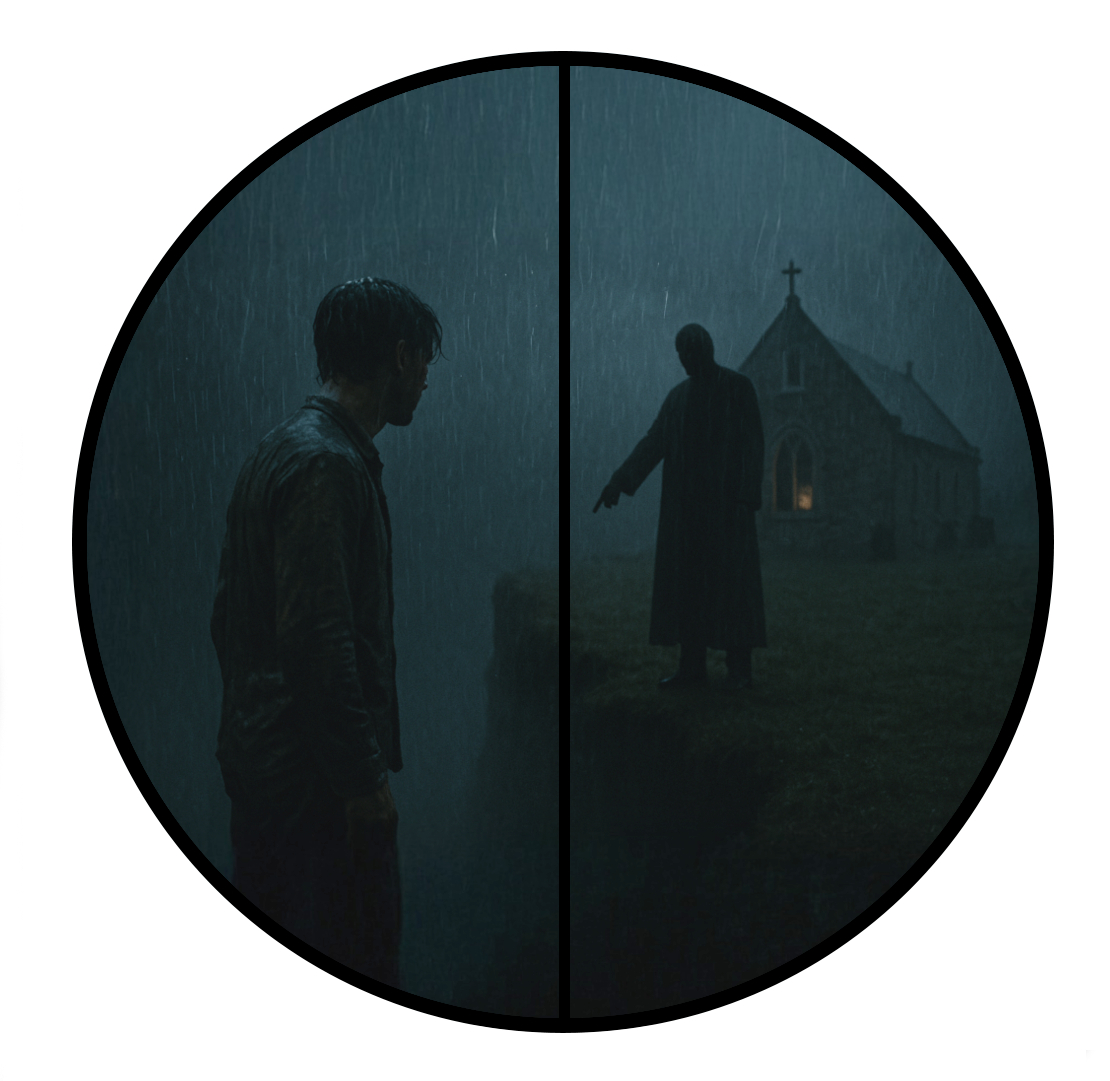Acts of Sent Away Ones 9
he asked close beside himself for epistles into Fertile Land ("Damascus") toward the Gatherings in such a manner that if he found anyone who are being of the Road, both men and women, he might lead those who have been bound into Foundation of Peace.
περιἀστράπτω - Flash Lightning All Around
And within the Going Over, a bringing of himself near the Fertile Land ("Damascus") became, and suddenly a daylight flashed lightning all around himself from out of the Heavenly One.39περι + ἀστράπτω - to flash or hurl lightning
Crossing a threshold, approaching to a zone of generativity. Before the flash: chronos-dominant perception (linear, adversarial, identity-projective). After the flash: aonic-dominant perception (pattern-synchronous, participatory, non-local in structure). The “light” is not visual but informational saturation—a rapid overwrite of the governing predictive model of reality.
A "sixth man" or integrative mode of perception that is not bound to linear sensory time. The "sixth man" is field-based rather than stimulus-based: he perceives relations, total states, and coherence across time, not discrete inputs. In this sense, the “sixth” is not another sense alongside the primitive five, but a coordination layer above them, where perception is no longer primarily about what happens next, but about how the whole is structured at once.
A Story of Two Sauls
And he who fell upon the Earthly One heard a voice, she who is saying to self, "Sheol Sheol, why are you chasing away myself?"And he said, "Who are you, Master?" And the one: "I, myself am Salvation, him whom you, yourself are chasing after!
Go, "Jonah"...
But stand up and enter into the City, and it will be chattered to yourself the thing which you, yourself must make."ἐνεοί - deaf and dumb, mute
And the Men, the ones who are jointly journeying with self, they had been standing by deaf and dumb, those who are hearing indeed the Voice, and those who are gazing at nobody.
"I am seeing him, and not
. I am beholding him, and not close."(Numbers 24:17 RBT)And Sheol was woken up away from the Earthly One, and as the Eyes of himself were opened, he kept looking at nothing, and those who are hand-guiding himself conducted into Fertile Land ("Damascus").
βλέπων - Not Looking, Aware
And he was being for three days one who is not aware, and he did not eat nor drink.And he was a certain Learner within Fertile Land, by a name of Favored of He Is ("Ananias"), and the Master said toward himself within a vision, "Favored of He Is" and the one said, "Behold! Myself, a master!"
Εὐθεῖαν - straight, direct (current of the river)
And the Master, he who stood up toward himself: "Proceed across upon the Current, the one who is being called Straight, and seek for Sheol within a house of Caster ("Judas"), by a name of Flat Basket ("Tarsea"), for behold! he is offering prayers!"And he perceived a man, Favored of He Is ("Ananias") by name, he who came in, and he who has put hands upon self in such a manner that he might look up.

And Favored of He Is separated, "Master I heard away from many around to the Man, this one, how many evils he made to the Holy Ones of yourself within Foundation of Peace ("Jerusalem"),
and in here he is holding an authority close beside the Arch Priests to chain up all the ones who are invoking the Name of yourself."
And the Master said toward himself, "Traverse across, because this one is an instrument of a choice to myself, of the Taking Up of the Name of myself in the eye of the Herds and of kings, and of sons of God Contends ("Israel"),
For I, myself will show to self all the things that he, himself must undergo over the Name of myself.
And Favored of He Is went away and entered into the House and he who has put upon himself the Hands said, "Sheol, brother, the Master Salvation, the One who was seen by yourself, has sent away myself within the Road, her whom you were coming in such a way that you might look up and be filled up of a holy spirit."
And immediately they fell away from the Eyes of himself as scales and he also looked up, and he who has stood up was plunged.
And he who has taken hold of a nourishment was invigorated, and he became in company with the Learners within Fertile Land for certain days.
And immediately within the Gatherings he kept proclaiming the Salvation, that this one is the Son of the God.
And they were being thrown out of position, all the ones who are hearing, and they kept saying, "Is not this one the one who ravaged into Foundation of Peace the ones calling upon the Name, this one, and he had come in here into this one so that he might lead themselves, the ones thrown into chains against the Arch Priests?"
And Sheol was all the more being empowered and kept confounding Casters, the ones who are settling within Fertile Land, he who is knitting/putting together that this one is the Anointed One.
And as sufficent days kept being filled up, the Casters advised together to take himself up.
ἐπιβουλὴ - plot, treachery, conspiracy (of the Philistines)
And the Plot of themselves, she was recognized to Sheol, and they kept watching closely also the Gate-Wings— both of day and of night in such a manner that they might take himself up.And the Learners of himself, those who have taken hold, they sent himself down by night straight across through the Defense Wall, those who have slackened within a large woven basket.
And he who became alongside into Foundation of Peace, he kept trying to glue to the Learners, and everyone kept being terrified of himself, those who are not trusting that he is a learner.
And Son of Prophecy ("Barnabas"), he who has taken hold of himself, led toward the Sent Away Ones and he set out in detail to themselves how he perceived the Master within the Road, and that he chattered to self, and how he spoke freely within Fertile Land within the Name of Salvation.
And he was in company with themselves, the one who is leading in and the one who is leading out into Foundation of Peace, the one who is speaking freely within the Name of the Master.
He kept both chattering and jointly investigating toward the Outsiders ("Hellenists"), and they were putting the hand to take up himself.
καταγώ - Leading down into the Nether World
And the Brothers, those who were thoroughly acquainted, led himself down into Dictatorship City ("Caesarea"), and dispatched himself into Flat Basket ("Tarsus").40

οἰκοδομέω - building up a house (Selah!)
The Summoned Assembly indeed therefore throughout the Whole of the Judean and Circuit and Guard Tower was holding peace, she who was being built up as a house and she who is leading across by the Fear of the Master and by the Consolation of the Holy Spirit, and she kept multiplying.41Straight into the Brow
And he became Small Stone who is passing through all things to come down and toward the Holy Ones, the ones who are inhabiting Travail ("Lydda").And he found there a man, a certain one by a name of Man of Praise ("Aeneas"),42 from out of years of eight, he who is lying down upon a mat, him who kept being one who has been side-dissolved.
And the Small Stone said to self, "Man of Praise, Salvation, an anointed one, is healing yourself! Stand up, and spread out smooth to your own self!" And immediately he stood up.
And they perceived himself, everyone of those who are settling in Travail and the Level Plain ("the Sharon"), anyone who wheeled back around upon the Master.
Δορκάς - “the one with bright/keen eyes”
And within Beautiful ("Joppa") a certain one was being a learner, by a name Roe-Deer ("Tabitha") who is she who is being translated/expounded, she is being called Bright-Eyed One ("Dorkas"),43 she, herself was being one filled satisfied of good works and charities, those whom she kept making.And she became within the Days, those ones, A Dying of Herself, the one who had become weak; and those who washed placed within an upper chamber.

the Death of the Child!"
Birth Pangs: "Pass through until you reach us, Don't be a Coward"
And as Travail was being near to the Beautiful, the Learners, those who have heard that Small Stone is within herself, sent away two Men toward himself, those who are calling in to their side: "Do not shrink back to travel across until ourselves!"44
And Small Stone, he who has stood up, joined with themselves, whom the one who has come beside they led up into the Upper Chamber and everyone of the Widows stood beside self, those who are crying and those who are pointing out tunics and outer garments, as much as the Bright-Eyed One kept making, she who is being in company with themselves.
Half Way
And the Small Stone, he who cast everyone outside, and he who placed the Knees, offered prayers; and he who wheeled back around toward the Body said, "Gazelle, stand up!" And he opened up the Eyes of herself, and she who perceived the Small Stone sat up.Esther: "Divided against herself she cannot stand"
And he who has given a hand to herself stood herself up; and he who crowed at the Holy Ones and the Widows presented herself, she who lives.
And she became known throughout the whole of Beautiful, and multitudes trusted upon the Master.
βύρσα - A tanner, a craftsman who works animal hides (βύρσα = “hide, skin”) and makes them into leather.
And she became to abide multitudinous days within Beautiful ("Joppa") close beside a certain one, Hearing ("Simon"), a tanner.Footnotes
περιήστραψεν αὐτὸν φῶς — aorist active indicative, 3rd person singular of περιστρέφω, “to whirl around, wheel around, rotate.”
Morphology:
-
περι- = “around, about” (prefix indicating circular or encompassing motion)
-
ήστραψεν = aorist indicative active 3rd person singular of στρέφω (“to turn”) → completes the stem περιστρέφω.
-
αὐτὸν = accusative masculine singular pronoun, “him” (direct object).
-
φῶς = accusative or nominative singular of φῶς, “light” (goal or direction of the turning, or if nominative, the cause/subject).
Literal sense:
-
“He turned him toward the light” or “He made him face the light.”
-
Action is completed (aorist), physical rotation or reorientation is implied.
Figurative / extended sense:
-
Could indicate moral, intellectual, or spiritual reorientation (“turning toward enlightenment, truth, or revelation”).
-
Common metaphor in Greek literature for guidance or awakening.
Construction note:
-
περιήστραψεν + accusative object + accusative goal is classical Greek syntax for “turn X toward Y.”
-
The verb here is transitive, and the accusative object marks the entity being turned; φῶς indicates the target/direction.
-
φῶς as nominative (emphasizing emergent light, predicate sense) or accusative (emphasizing goal/direction).
-
In περιήστραψεν αὐτὸν φῶς, context usually favors accusative directional reading: “He turned him toward the light.”
-
If taken as nominative, the phrase could suggest light as the resulting state or effect of the turning.
Etymological clarification:
-
περιήστραψεν derives from περιστρέφω, not ἀστράπτω (“to flash, to shine”).
-
Though the stem -στραψ- superficially resembles ἀστράπτω, morphology and classical usage confirm the rotational sense, not luminous flash.
-
If one wanted to form a verb from ἀστράπτω with the idea of “turning around in a flash,” the correct aorist infinitive would be περιαστράψαι (“to flash around”), which is used later in Acts 22:6.
Parallel Hebrew/LXX concepts:
-
Transitive “bring near” or “turn toward” parallels סַב / פנה / הפך.
-
The addition of φῶς as the goal mirrors Hebrew figurative language פנה אל האור (“turn to the light”) or סוב את פניו לאור (“turn one’s face to the light”), used both literally and metaphorically for guidance, enlightenment, or salvation.
Summary:
-
περιήστραψεν αὐτὸν φῶς = “he turned him to the light” (physical, moral, or spiritual).
-
Verb is rotational (περιστρέφω), not luminous (ἀστράπτω).
-
Accusative construction marks the person being turned; φῶς marks the direction.
-
Any figurative meaning (“enlightenment,” “awakening”) derives from the collocation with φῶς, not from the verb stem.
(cf. LSJ περιστρέφω)
Ταρσεύς literally derives from ταρσός, a neuter noun meaning “frame of wicker, crate, or flat basket”, originally used for:
-
Practical applications – drying cheese (Od. 9.219, Theoc. 11.37) or as mats of reeds in brickwork (Hdt. 1.179; Thuc. 2.76).
-
Extended meanings – any flat, supportive, or layered structure, including the flat of the foot, rows of feathers, eyelid edges, or rows of oars.
As a proper name (Ταρσεύς) or ethnonym, the term likely reflects a toponymic or descriptive origin:
-
Literal sense: “place of mats or flat frames” (i.e., a site characterized by reed mats, flatlands, or basketry).
-
Metaphorical sense: may convey a structured or layered space, or by extension, a person or people associated with such a place.
Thus, Ταρσεύς could be understood as “one from the place of flat frames/mats”, linking the material/structural sense of ταρσός to a toponymic or tribal identity.
(cf. LSJ ταρσός)
οἰκοδομέω building a house has often been translated in its metaphorical sense as "edified." This is not the primary literal meaning (cf. LSJ οἰκοδομέω)
The modern translations, wanting to force the narratives into a chronological history disgracefully hacked the present participle senses of "she who is built up" and "she who is leading/traversing across" to the past tenses "was built up," "were edified," "was strengthened," "having gone," etc.
These are all false translations. The present tense does not equate to the past tense.
The name Αἰνέας derives from the Greek root αἶνος (“praise, commendation, laudatory tale”) and the verb αἰνέω (“to praise, approve”). Thus Αἰνέας carries the sense “the praiseworthy one” or “man of praise.” In Greco-Roman tradition, Aeneas is the Trojan hero, son of Anchises and Aphrodite, who survived the fall of Troy and became the legendary progenitor of Rome. In Acts 9:33, the same name is borne by a paralytic in Lydda, likely reflecting the Greek heroic name rather than a Semitic equivalent.
The name Δορκάς (“roe-deer, gazelle”) is traditionally derived from δέρκομαι, highlighting the animal’s large, bright eyes and acute vigilance, illustrating a common Greek practice of naming animals by distinctive physical traits.
The Greek verb δέρκομαι (perf. δέδορκα) means “to see clearly, perceive with the eyes, look intently.” It is a deponent verb used throughout classical literature to emphasize active perception or keen sight, often with a nuance of careful observation or scrutiny. Examples:
-
Homeric: δέδορκεν ἄρα Ἀχιλλεύς — “Achilles saw clearly” (Il. 1.83).
-
Hellenistic / Historiographical: Herodotus, Xenophon — used to describe animals or humans perceiving sharply (e.g., a Δορκάς noted for its bright, alert eyes).
-
Figurative usage: δέρκομαι can convey mental or spiritual insight, not merely physical sight (e.g., Plutarch, Aristophanes).
The perfect form δέδορκα emphasizes completion or certainty of perception, often translated as “I have clearly seen” or “I have perceived fully.”
All the modern English translations render ἕως ἡμῶν as “to us”, effectively absorbing the temporal nuance of ἕως into the prepositional sense of “to”.
-
Greek: διελθεῖν ἕως ἡμῶν → literally “to pass through until to us”
-
English (modern translations): “come to us”
Observations:
-
ἕως + genitive normally conveys “until / up to” in a temporal or spatial sense.
-
Translators render it as “to us” to force the text to read naturally in English. Greek normally uses prepositions for this sense (e.g. ἔρχεσθε πρὸς ἡμᾶς “come toward us”)
-
The subtle implication of duration or endpoint (literally, “until he reaches us”) is mostly lost; the idiomatic takes emphasize the goal of the journey, not the temporal “until.”
So while the Greek emphasizes the endpoint/arrival, modern translations, as usual, prioritize English idiomatic bias.